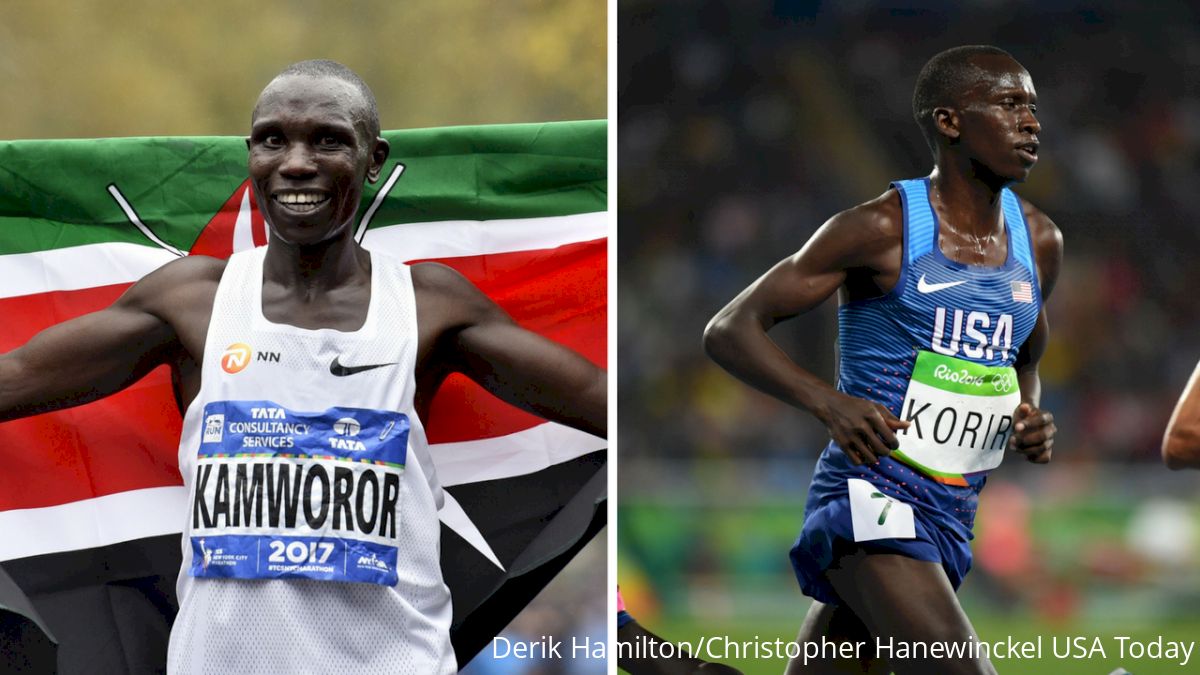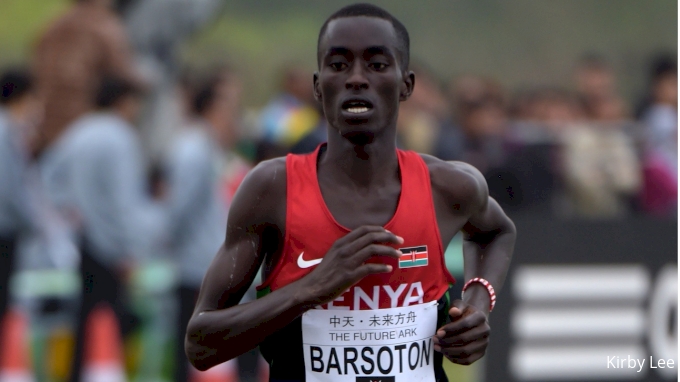Kamworor Goes For The 3-Peat, U.S. Tries For A Medal: World Half Preview
Kamworor Goes For The 3-Peat, U.S. Tries For A Medal: World Half Preview
Geoffrey Kamworor will go for his third straight world half marathon championships gold medal, while the U.S. will try to get a historic team medal.

The 2018 World Half Marathon Championships offers a chance to see Geoffrey Kamworor go for his third straight title, a Kenyan contingent that features five men who have run faster than one hour, and an American team with a legitimate shot at a historic podium finish.
In short, Saturday's race has a little bit of everything. The course in Valencia, Spain, is fast—and the weather is supposed to be conducive to fast times, adding an extra element of interest to one of the calendar's only global championships.
Viewers In Canada Can Watch The World Half Marathon Championships Live On FloTrack
Here are four big questions heading into Saturday’s men's race.
1. Can The U.S. Team Get On The Podium?
In the 15 editions of the world half marathon championships, the U.S. men’s team has never won a team medal. The closest the Americans got was in 2009, when they narrowly missed out on a bronze medal by eight seconds.
It’s worth clarifying here how scores will be tabulated at this year's World Half Marathon Championships. According to the IAAF, "Teams may enter a maximum of seven athletes, but no more than five shall be allowed to start in each race. The top three finishers for each team will score points. Team results are decided by the aggregate of places recorded by the scoring athletes of each team. The team with the lowest aggregate of points will be judged the winner."
In other words, it's cross country style scoring. In the past, the team competition was scored using a cumulative time from each country's top three finishers. In that 2009 meet, the U.S. was buoyed by Dathan Ritzenhein’s third-place finish. His 1:00:00 was enough to get the United States within shouting distance of a medal despite the fact that the other two scoring runners for the United States finished 20th and 38th.
The Americans are bringing a solid squad this year, so they have the ability to have a top finisher like Ritzenhein in 2009, as well as the depth to put two more men inside the top 25. Will that be enough to break into the top three?
That type of finish will still be tough with Kenya, Ethiopia, Eritrea, and Bahrain sending strong teams, but at the very least the U.S. is taking their best shot. Of the eight Americans who have run 1:02:00 or faster since 2017, four are on this team. The addition of Galen Rupp—who broke 60 minutes in Rome a few weeks ago—could have vaulted this team into the realm of medal favorite (the inclusion of 1:01:01 runner, Haron Lagat also would have helped), but for a world half marathon championship, this is a good group.
The Americans are led by Leonard Korir. The 31-year-old ran 59:52 in New Delhi last year and has plenty of experience in big races. He hasn’t tackled a half marathon yet this year, but he has run two cross country races and a 15K on the roads. The shorter distance focus could mean that Korir is primed for a big run that propels the Americans to a top-three finish. But this isn’t a one-man team. There’s strength behind Korir, which is why there is optimism around the U.S. squad. Sam Chelanga ran 1:00:37 for a personal best at the 2018 Houston Half Marathon in January and has the ability to keep the gap small between him and Korir.

Sam Chelanga ran 1:00:37 in January's Houston Half Marathon
The three other members of the U.S. team also ran in Houston this year. Diego Estrada ran 1:01:46, Bernard Lagat posted at 1:02:00, and Jared Ward ran 1:02:10. Estrada’s performance on Saturday will go a long way to determining the fate of the U.S. team. He’s shown the ability to be brilliant in this distance, but he has also been inconsistent. If he runs like he did in 2015, when he put up a 1:00:51 in his debut half marathon, then the U.S. will find themselves in a good position. The course and conditions in Valencia are ripe for fast times. If the U.S. puts three men under 1:01:00, then it would take an incredible day for three teams to beat them.
2. Who Can Challenge Kenya For The Team Title?
If the U.S. is able to medal, they will make their own history and break up the Kenya/Ethiopia/Eritrea stranglehold of the podium. The three nations have finished in some combination of 1-2-3 in the last five editions of the race, with Kenya taking gold in four of them.
Kenya is in a good position to repeat as champions. The slowest personal best of their group of five is 59:28. Geoffrey Kamworor is a solid favorite to win the race, but Jorum Okombo actually has a faster personal best—a 58:48 from Copenhagen last year. Leonard Barsoton was fifth in that same race, running 59:28.
If you are looking for weaknesses, Alex Korio only finished eighth in Houston in January. But he has a personal best of 58:51 so that should make Kenya overly concerned. A sub 59-minute half marathoner having a bad day is a good problem to have. Besides, with the team scoring structured the way it is, two of these five could be completely off and Kenya would still roll.

Geoffrey Kamworor on his way to victory at the 2017 New York City Marathon
Ethiopia has a solid team up front, but doesn’t have the depth of Kenya. Jemal Yimer ran 59:00 at the reliably fast RAK half marathon on February 9. That was the debut at the distance for the 21-year-old. Leul Gebresilase was second in the Dubai Marathon in January and ran 59:18 in Valencia last year. Both men have the capability of sticking with the Kenyans, but both also have questions. How will Gebresilase recover from his marathon? Can Yimer repeat his debut brilliance?
Behind those two, Ethiopia doesn’t have another team member who has run under 60 minutes. Is that enough to place in the top three? Definitely. Good enough for gold? Not unless Kenya falters.
Eritrea and Bahrain both will challenge Ethiopia for silver. Eritrea took bronze in 2016, gold in 2014, and silver in 2012. Their 2018 team is very deep, with four runners boasting personal bests of 1:00:29 or faster. Nguse Amlosom has run 59:39, while Abrar Osman, Amanuel Mesel, and Hiskel Tewelde could make a tight pack for the Eritreans. Bahrain features Abraham Cheroben, who has a personal best of 58:40 from his victory in Copenhagen. A performance anywhere near that on Saturday would put him in the hunt for the individual title (more on that below) and could lift Bahrain to a medal.
Interestingly, Bahrain has also entered Albert Rop. He has a 5000m personal best of 12:51.96, but has never raced longer than 12 kilometers. Maybe the combination of Rop and Cheroben is enough to sneak a bronze.
3. Will Geoffrey Kamworor Win His Third Straight Title?
Despite his victory at the New York City Marathon last fall, Kamworor’s best distance is still probably the half marathon. He’s won this race twice and has run 59:31 or faster on seven different occasions. Before he was a major marathon champion, Kamworor made his name by winning cross country and half marathon championships. In 2016, he fell at the start of this race and still got the victory. This year, he’s 2-for-2 in cross country races, so there’s no reason to think he’d be anything other than the favorite.
His best competition from outside Kenya will come from names that were mentioned in the discussion of the team race: Jemal Yimer and Leul Gebresilase of Ethiopia and Abraham Cheroben of Bahrain. As far as challengers from his own country, Jorum Okombo might be over-raced, or in top form depending on your perspective. The 20-year-old ran two half marathons 16 days apart in February. In his first season of serious racing last year, he ran under 60 minutes on two occasions.
Leonard Barsoton upset Kamworor at the Kenyan cross country championships last year before Kamworor reverted to dominant Kamworor form at the world cross country championships to take gold. Barsoton has only run one half marathon—that 59:28 in Copenhagen—so perhaps his potential in the distance is untapped.

Leonard Barsoton is part of an incredibly deep Kenyan team
Julien Wanders isn’t expected to challenge for the victory, but the man from Switzerland is one of the most interesting stories in the race. On February 11, Wanders ran 1:00:09, breaking the European U23 record and taking more than 90 seconds off his personal best from the year before. Along with Sondre Nordstad Moen of Norway, Wanders is a part of an unexpected European resurgence in road racing. Wanders turned 22 years old on Sunday and is now a known quantity. How will that impact him in the biggest race of his young career?
4. Who Takes The Japan/U.S. Matchup?
Back to the team battle. Even if the U.S. doesn’t get in the top three, I’ll be very interested in watching if they are able to beat Japan. Japanese depth at this distance is well-documented. Thirteen men have run 1:02:00 or faster since 2017, compared to eight for the U.S. But it’s also well-known that fast times don’t always correlate to better performances at championship settings. Of those 13 men who have run 62 minutes or faster, three are set to race for Japan on Saturday. Unfortunately, Japan’s best half marathoner, Yuta Shitara, is not on the start list. Shitara set the Japanese record when he ran 1:00:17 in 2017.

Suguru Osako is key to Japan's hopes in the team competition
But the absence of Shitara makes for a better comparison with the U.S. The Americans, after all, are without Galen Rupp. Japan does have the services of the Murayama twins, Kenta and Kota. Kenta has a personal best of 1:00:50, while Kota ran 1:02:00 this year, a lifetime best. The Nike Oregon Project’s Suguru Osako gives Japan a solid 1-2-3. Osako ran 1:01:13 last spring on his way to a third-place finish at the Boston Marathon.
On paper, the U.S. looks the better of the two, but only slightly. If Leonard Korir can finish in the top 10, it would providee the U.S. with a nice margin for error with the other two runners. Japan has finished ahead of the United States in the last two championships, although the margins have been small: 17 seconds in 2016 and 33 seconds in 2014. Whether it’s the battle for bronze or for fifth place, expect these two nations to be close again on Saturday.